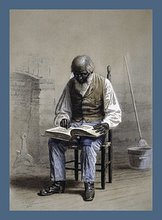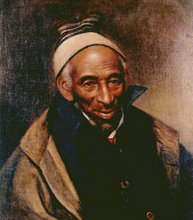Right off, we can tell from the title that Elkins believes that slavery and its aftermath pose a problem for all Americans that, if it had already been solved, would not necessitate his writing the book. This is important, because to my mind Elkins begins to get at the problem that Ralph Ellison points to, that slavery, Jim Crow, and the continuing crisis in race relations have fostered a "culture that is opposed to the deep thought and feeling necessary to profound art; hence its avoidance of emotion, its fear of ideas, its obsession with mere physical violence and pain, its overemphasis of understatement, its precise and complex verbal contructions for converting goatsong into carefully undulated squeaks." [See "Assumptions to be Tested" in January Archives]
The crucial point is made in the second essay, in the comparison of the slave systems of the United States and of South America. Brazil's slave system was closer to that of the United States, but in his rejoinder to critics on this score, Elkins documents that the differences that still remained were crucial in the Brazilian case also. Elkins makes this a polemic about institutions or the lack thereof in the United States. There were no institutions in the United States, he says, to put a brake on the rapaciousness of the Southern planters, whereas in South America there were. Elkins in part wants to shift the historiographic debate from a moral debate on slavery--pro and con--to an examination of the wider cultural and legal context for the chattel system of slavery that existed here, which he says, is unprecedented in history. Inadvertently perhaps, however, he begins to get to the crux of the problem in the United States that continues to plague us today.
Elkins does not compare the conditions of slaves here and in South America per se but compares the legal structures that held the slave systems in place. For the United States, he presents an overview of the transition in colonial America, from a situation in which there were many indentured servants, both white and black, to the elevation of the white indentured servants and the full-scale enchattelment of the black indentured servants and new slaves, and its corollary, the de-elevation of free blacks to the status of second-class citizen. By 1710 the flow of white servants to America had virtually come to a halt [49]. "For the plantation to operate efficiently and profitably, and with a force of laborers all of whom may have been fully broken to plantation discipline, the necessity of training them to work long hours and to give unquestioning obedience to their masters and overseers superseded every other consideration. The master must have absolute power over the slave's body, and the law was developing in such a way as to give it to him at every crucial point. Physical discipline was made virtually unlimited and the slave's chattel status unalterably fixed."
This was the slave's fixed legal status. This legal status had been established by the latter half of the seventeenth century. Elkins then examines three other aspects of the slaves' legal status:
marriage and family; police and disciplinary powers over the slave; and property and other civil rights.
For the slave in the United States, "That most ancient and intimate of institutional arrangements, marriage and the family, had long since been destroyed by the law, and the law never showed any inclination to rehabilitate it." Although informally masters may have permitted marriage, and although the slavetrader who separated familes was viewed with contempt in white society, nevertheless, "yet the very nature of the plantation economy and the way in which the basic arrangements of Southern life radiated from it, made it inconceivable that the law should tolerate any ambiguity, should the painful clash between humanity and property interest ever occur." Elkins also notes that children derived their condition from their mother, since if it were conferred by the father's condition, the question would be what to do with all the mulatto children born of slave mothers and white masters? "That 'the father of a slave is unknown to our law' was the universal understanding of Southern jurists. It was thus that a father, among slaves, was legally 'unknown,' a husband without the rights of his bed, the state of marriage defined as 'only that concubinage...with which alone, perhaps their condition is compatible.'"
In matters of discipline, the slave had no repeal and no recourse, no standing before the law. There was never any law upholding the slave's rights against assault, and therefore no law was violated if a master did what he would with a slave, even up to the point of murder. (Of course this lawlessness outlasted slavery, as can be seen from the post-Civil War lynchings and disappearances of African American men, and even in boys, as shown by the murder of Emmett Till.)
The rights of property, and all other civil and legal rights were "everywhere denied the slave with a clarity that left no doubt of his utter dependency upon his master. 'A slave is in absolute bondage; he has no civil right; and can hold no property, except at the will and pleasure of his master." He could make no gifts, write no will, inherit nothing. He did not own himself, as he could not hire himself out or make contracts for any purpose. "Neither his word nor his bond had any standing in law." In delineating this, Elkins quotes from Alabama court opinions.
The slave had no civic privileges of religion or education. With the exception of Maryland and Kentucky, he reports, stringent laws were in place prohibiting anyone from teaching a slave to read or write. In North Carolina it was against the law to give a slave any book, including the Bible. Slaves were only allowed to worship within the carefully constructed constraints set by white preachers and the master. They were forbidden to worship outside of those bounds--if at all, and hence the spiritual, Steal Away. Although the Presbyterian Church had deplored this condition, the churches were unable or unwilling to do anything about it.
This created the "most unplacable race-consciousness yet observed in virtually any society." The syllogism went like this: "All slaves are black; slaves are degraded and contemptible; therefore all blacks are degraded and contemptible." This racial hysteria of the South precluded the concept a free black; "such a class was unnatural, logically awry, a blemish on the body politc, an anomaly for which there was no intellectual category."
Elkins contrasts this North American institution of chattel slavery with slavery in the Ibero-dominated South America, noting first that slavery had existed in Spain for centuries, before the arrival in the 15th century of slaves from Africa. Thus a slave system existed that had two contradictory assumptions: slavery existed, but slavery was a violation of man's divine and natural equality and "against reason and nature." Thus the slave system was a bundle of laws that treated the slaves as persons who had gotten into a bad strait and had lost rights, but with avenues available to re-acquire those natural rights, as opposed to persons who had no inherent personhood or rights. Elkins says that this difference exists, because the Ibero slavery was far closer to the slave systems of antiquity, and also because the semi-medieval character of Spain placed institutional constraints on the capitalist planters: the crown and the church.
For the crown, "the introduction of slaves into the colonies brought much discomfort to the royal conscience." Charles V, who had first granted license to transport large numbers of blacks from Africa to the colonies, ordered the freeing of all slaves in South America, but when he retired to the monastery this was overturned. Same with Queen Isabella earlier. King in 1679 was looking for theologians who had written on the subject of slavery. From this it followed, that legally the slavemaster never had the total control over the slave's body that characterized slavery in North America. A master could legally beat a slave, but not to the point of drawing blood or inflicting contusions. If a slave was accused of crimes, he was tried in the same court that any free man would be tried in. Slaves had legal holidays and legally mandated time off. Slaves could buy their freedom, by contracting their labor out to another person. The master was legally forced to set a sales price. These laws were generally enforced, except in Brazil where enforcement was weak.
As for the church, while it did acknowledge slavery and accommodate to it, it nonetheless also consistently warned that the slaveholder was in danger of mortal sin. Hence, the church was active in encouraging slave manumission, which was permitted throughout the system. The church never denied the injustice of slavery, and the 18th-century prelate Cardinal Gerdil stated categorically: "Slavery is not to be understood as conferring on one man the same power over another that men have over cattle...For slavery does not abolish the natural equality of man."
Thus, the church acted to encourage manumission to save the mortal soul of the slaveower and also acted to better the conditions of those in slavery. The church ministered to slaves. This means that slaves had to be baptized and to take the sacraments, including the sacrament of marriage. Slaves owned by different owners who wanted to marry were to be allowed to do so; families could not be separated. The church ministered to slaves and also priests functioned as inspectors of the system, reporting cases of abuse, etc. " As Elkins reports:
"A Caribbean synod of 1622, whose santiones had the force of law, made lengthy provisions for the chastisement of masters on feast days. Here the power of the Faith was such that master and slave stood equally humble before it. 'Every one who has slaves,' according to the first item in the Spanish code, 'is obliged to instruct them in the principles of the Roman Catholic religion and the necessary truths in order that the slaves may be baptized within the first year of their residence in the Spanish dominions.' Certain assumptions were implied therein which made it impossible that the slave in this culture should ever quite be considered as mere property, either in law or in society's customary habits of mind. These assumptions, prepetuated and fostered by the church, made all the difference in his treatment by society and its institutions, not only while a slave, but also if and when he should cease to be one. They were, in effect, that he was a man, that he had a soul as precious as any other man's, that he had a moral nature, that he was not only as susceptible to sin, but also as eligible for grace as his master--that master and slave were brothers in Christ." [emphasis added]
It was precisely this status as a man under God that was denied to the slave of the South and also to the freed Negro. The heart of the chattel slavery and Jim Crow society in the United States is the denial of the soul of the African American. Witness the syllogism Elkins states above. This denial of a soul is at the root of the sickness in America in race relations. For how can anyone deny the soul of another human being, without also incurring grave damage to their own? Is this the source of what Ellison calls "the culture that is opposed to the deep thought and feeling necessary to profound art"? This is the avenue for exploration. Nor should it be thought that this existed only in the South, witness the virulent and violent reactions when blacks attempt to move into white Northern neighborhoods.
Even worse, the slave and black person was not only denied a soul but positively demonized, in order to perpetuate a rationale for the existence of slavery and Jim Crow itself. Hence, the struggle for civil rights and racial justice in the United States has always take the form of an assertion of soul: its emergence from the African American churches; the eloquent expression of this soul through at first religious music; the Souls of Black Folk by W.E.B. DuBois, and then later: soul food, soul music, soul brother. Talk of soul food, soul music, soul brother would never be necessary in a society in which the soul of an African American were taken for granted.
In South America, because the slave and the black was never denied a soul, they could be freely assimilated into the society. The society's racism was in the form of a caste system, so that a wealthy black person was fully assimilated and considered "white." Writes Elkins: "Free Negroes had the same rights before the law as whites, and it was possible for the most energetic of their numbers to take immediate part in public and professional life."
Elkins concludes: "All such rights and opportunities existed before the abolition of slavery; and thus we may note it as no paradox that emancipation, when it finally did take place, was brought about in all these Latin American countries 'without violence, without bloodshed, and without civil war.'" [Elkins quoting Tannenbaum, Slave and Citizen]
The continuing lack of assimilation of African Americans into American society, it therefore follows, represents the continuation of the denial of the soul to the African American, now in the context of a society in which many deny the existence of the soul at all.
Sunday, March 19, 2006
Subscribe to:
Post Comments (Atom)



1 comment:
Thank you for a very illuminating post. The Ibero-Americans also treated the indigenous populations more humanely.
Post a Comment